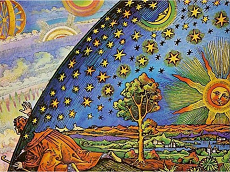Both “quantum mechanics” and “quantum physics” mean the study of subatomic particles. But “quantum mechanics” is more specific. It’s the term used for the field once it was formulated into mathematical laws. Then, it became a kind of mechanics. Prior to the development of mathematical laws governing subatomic particles, the field was called “quantum theory” …
What is wave function collapse? Is it a physical event?
In one view, a wave function is a piece of math, an equation. It’s not a physical thing. So, it can’t collapse in any physical sense. The collapse is metaphorical. This is one interpretation of quantum mechanics. It’s the interpretation taught in most university classes, the Copenhagen Interpretation. However, physicists have not settled on a …
Are electrons waves or particles?
The accompanying video demonstrates how an electron can be both a particle and a wave. (The video has two unfortunate errors in it, which I’ll point out.) The video shows how different kinds of objects, including an electron, act when they speed towards a barrier perforated by two slits. Then, it shows the pattern the …
What is the difference between a photon and a quantum?
A photon is a tiny particle of light. It is the tiniest particle of light possible in nature. A photon can also be described as a type of quantum, that is, a tiny particle. Some other types of quanta (plural) are electrons, neutrinos, and the Higgs boson. A quantum is the tiniest particle possible of …
Why does the Born Rule predict quantum probabilities?
There’s both a mathematical explanation and an explanation based on the nature of reality. First, the mathematical explanation: Let’s take the example of the Double Slit Experiment. A laser shoots photons one-at-a-time through the two slits of a screen towards a photographic plate. The wave function is the equation that describes the behavior of the …
How do we know a quantum particle is in a superposition if detecting the particle will destroy the superposition?
It’s not possible to KNOW that the particle is in a superposition of states since we can’t observe the superposition. The superposition idea is trying to explain what must be happening in the real world given that Schrodinger’s Wave Equation works. Schrodinger’s Wave Equation (and later upgrades like the equations of Quantum Electrodynamics) are very successful …
What are some good online resources that can help me understand physics better?
The Physics Classroom and Khan Academy both have excellent free on-line courses on physics, starting from the beginning. They’re step-by-step and give practice problems. On Khan Academy, if you sign in, it will keep track of your progress. It also gives “awards” like badges for good progress. Both websites are excellent. Khan Academy is a little more …
How do I get started in learning quantum mechanics?
Videos on the Youtube channel “Looking Glass Universe” provide the clearest intro to quantum mechanics that I’ve found. They don’t require math nor a prior knowledge of physics, and they take it slow. However, they really get you into the midst of quantum mechanics. It’s not a light once-over. Of course, start with #1 and …
Can quantum mechanics be understood? Does it make logical sense?
Quantum mechanics is logical. By logical, I mean that the assumptions, the principles, the equations, and the empirical data all fit together. They don’t contradict each other. However, quantum mechanics (QM) does not fit with the assumptions and principles of classical physics (physics prior to 1900 that we learned in high school). QM is the …
Why study quantum physics?
Here’s why I began studying quantum physics. I wondered: How does this universe work? What underlies molecules and atoms? How is reality created? Quantum physics is part of the answer—a huge part. But the trouble is, physicists don’t understand how quantum particles create the solid objects that our senses perceive. After all, quantum particles are just …
